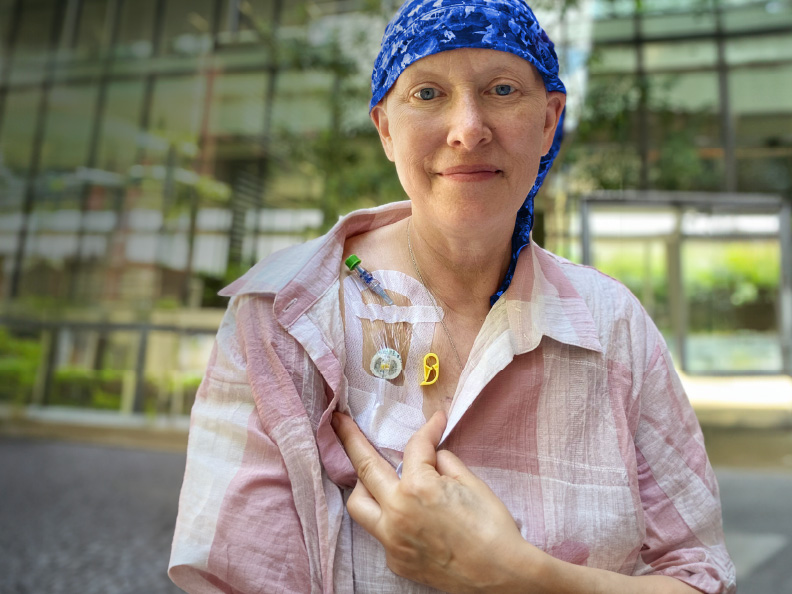Your gift is 100% tax deductible
What Causes Osteosarcoma?
Researchers have found that osteosarcoma is linked with a number of other conditions, which are described in Osteosarcoma Risk Factors. But the cause of most osteosarcomas is not clear at this time.
Scientists have learned how certain changes in the DNA in bone cells can cause them to become cancerous. DNA is the chemical in our cells that makes up our genes, which control how our cells function. We usually look like our parents because they are the source of our DNA. But DNA affects more than how we look. It influences our risks for developing certain diseases, including some kinds of cancer.
Some genes control when our cells grow, divide to make new cells, and die:
- Genes that help cells grow, divide, or stay alive are called oncogenes.
- Genes that help control cell division, repair mistakes in DNA, or make cells die at the right time are called tumor suppressor genes.
Cancers can be caused by gene changes that keep oncogenes turned on, or that turn off tumor suppressor genes.
Some people inherit gene mutations (changes) from a parent that increase their risk of cancer. In this situation, all of the cells in the body carry the same gene change. These are called germline or inherited mutations. But more often, cancer-causing changes are acquired during life rather than inherited before birth. In this case, the change occurs only in the cells that will develop into cancer. These are called somatic or acquired gene changes.
Inherited gene changes
Some inherited DNA mutations result in syndromes that are linked with an increased risk of osteosarcoma. For example:
- The Li-Fraumeni syndrome is usually caused by inherited mutations that turn off the TP53 tumor suppressor gene. These mutations give a person a very high risk of developing one or more types of cancer, including breast cancer, brain tumors, and osteosarcoma.
- Inherited changes in the retinoblastoma (RB1) tumor suppressor gene increase the risk of developing retinoblastoma, a type of eye cancer that affects children. Children with this gene change also have an increased risk of osteosarcoma, especially if they are treated with radiation.
If you are concerned you or your child might possibly have an inherited gene change, talk with your doctor about whether genetic testing might be helpful. You can also read more about this in Genetics and Cancer.
Acquired gene changes
Most osteosarcomas are not caused by inherited gene mutations, but instead are the result of gene changes acquired during the person’s lifetime.
Sometimes these gene changes are caused by radiation therapy used to treat another form of cancer, because radiation can damage the DNA inside cells.
But many gene changes are probably just random events that sometimes happen inside a cell, without having an outside cause. Cells that are dividing quickly are more likely to create new cells with mistakes in their DNA, which increases the risk that a cancer such as osteosarcoma may develop. This may be why some normal situations (such as the teenage growth spurt) and some diseases (such as Paget disease of bone) that cause rapid bone growth increase the risk of osteosarcoma.
Other than radiation, there are no known lifestyle-related or environmental causes of osteosarcoma, so it's important to remember that in most cases people with these cancers could have done nothing to prevent them.
Researchers now understand some of the gene changes that occur in osteosarcomas, but it’s not always clear what causes these changes. As we learn more about what causes osteosarcoma, hopefully we will be able to use this knowledge to develop ways to better prevent and treat it.
- Written by
- References

The American Cancer Society medical and editorial content team
Our team is made up of doctors and oncology certified nurses with deep knowledge of cancer care as well as editors and translators with extensive experience in medical writing.
Anderson ME, Dubois SG, Gebhart MC. Chapter 89: Sarcomas of bone. In: Niederhuber JE, Armitage JO, Doroshow JH, Kastan MB, Tepper JE, eds. Abeloff’s Clinical Oncology. 6th ed. Philadelphia, Pa: Elsevier; 2020.
Gorlick R, Janeway K, Marina N. Chapter 34: Osteosarcoma. In: Pizzo PA, Poplack DG, eds. Principles and Practice of Pediatric Oncology. 7th ed. Philadelphia Pa: Lippincott Williams & Wilkins; 2016.
National Cancer Institute. Osteosarcoma and Malignant Fibrous Histiocytoma of Bone Treatment (PDQ). 2020.
Accessed at https://www.cancer.gov/types/bone/hp/osteosarcoma-treatment-pdq on July 27, 2020.
Wang LL, Gebhardt MC, Rainusso N. Osteosarcoma: Epidemiology, pathogenesis, clinical presentation, diagnosis, and histology. UpToDate. Accessed at www.uptodate.com/contents/osteosarcoma-epidemiology-pathogenesis-clinical-presentation-diagnosis-and-histology on July 27, 2020.
Last Revised: October 8, 2020
American Cancer Society medical information is copyrighted material. For reprint requests, please see our Content Usage Policy.
American Cancer Society Emails
Sign up to stay up-to-date with news, valuable information, and ways to get involved with the American Cancer Society.



